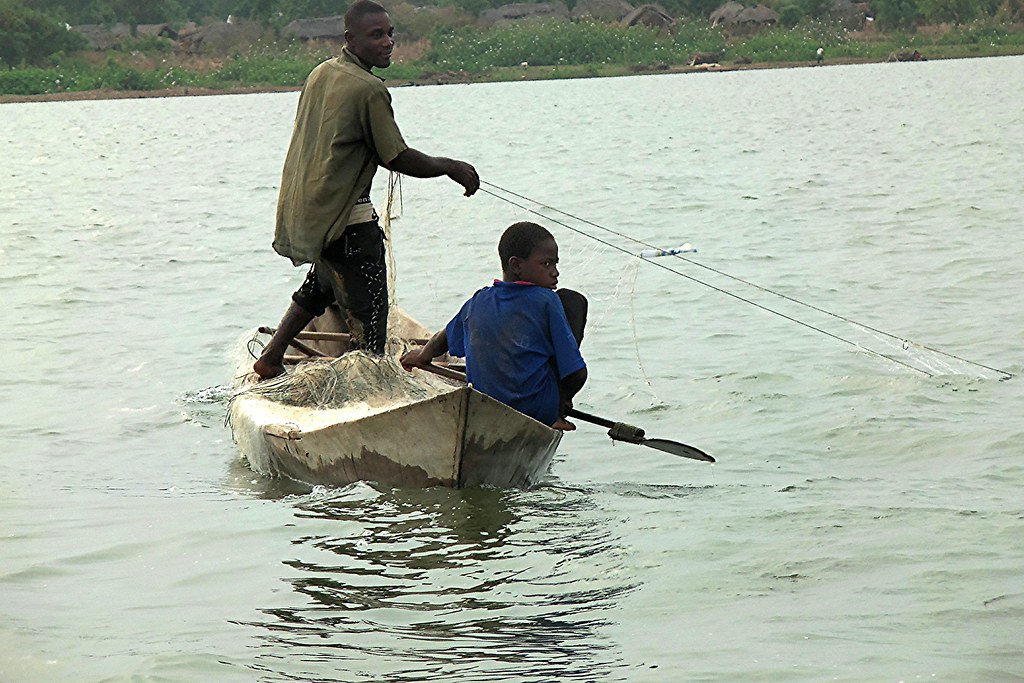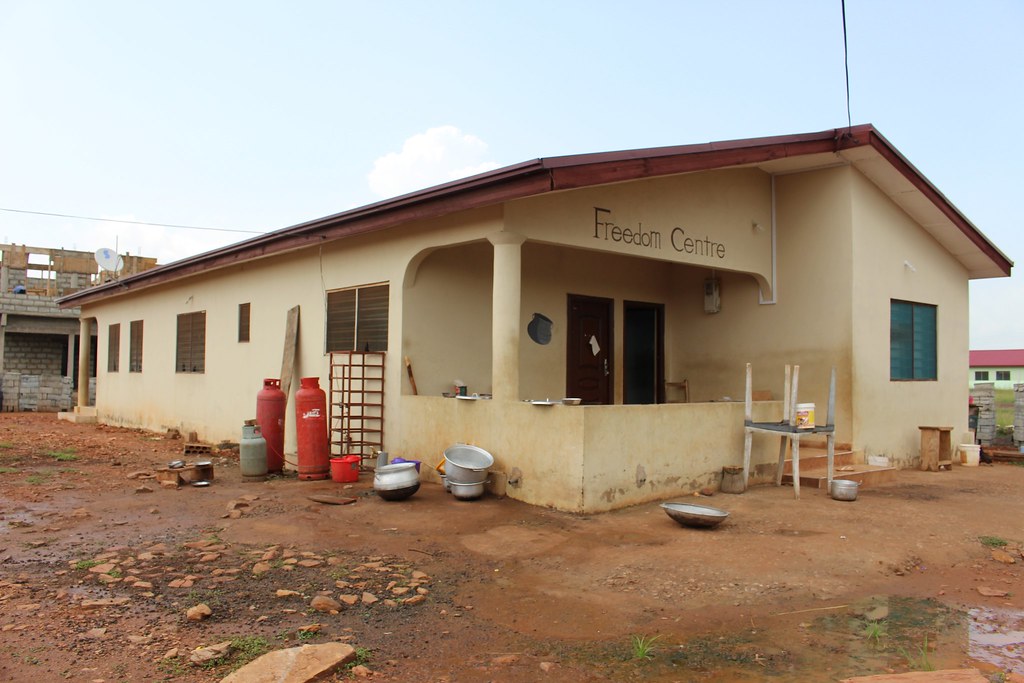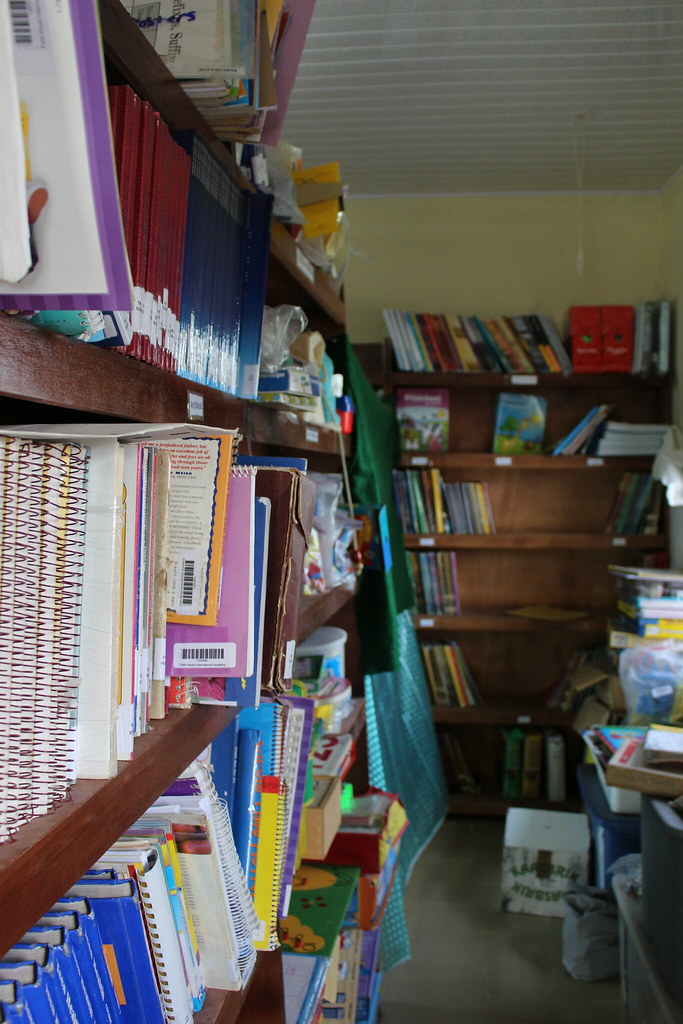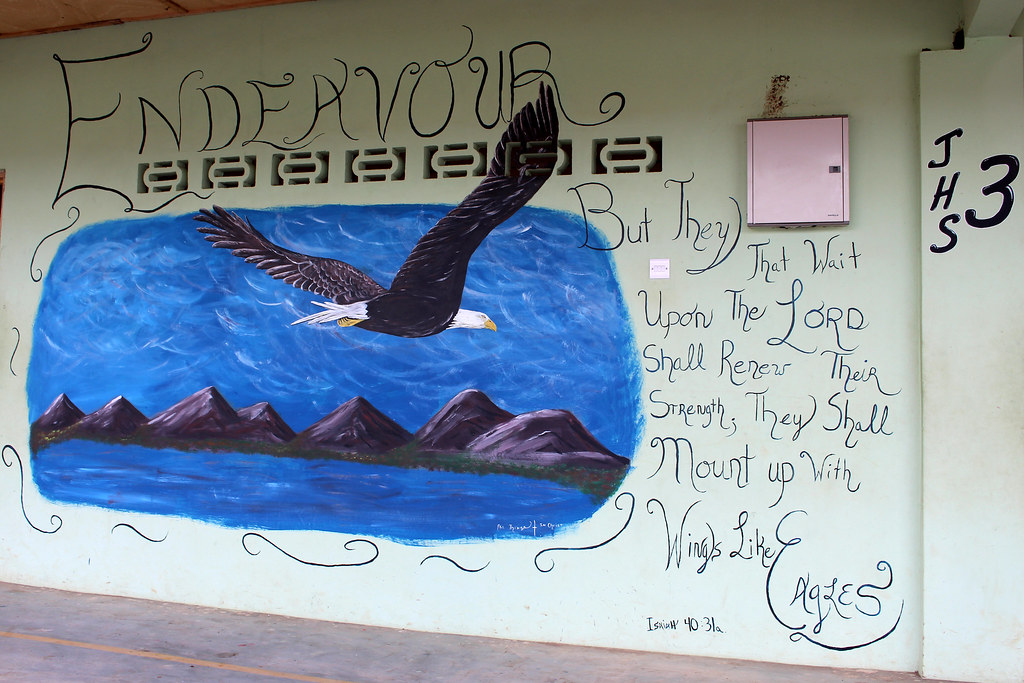By Lindsay Boyle
In Ghana, European-built slave forts and castles scatter along the coast — most notably those at Elmina and Cape Coast — and serve as reminders of the central role the country played in the trans-Atlantic slave trade more than 200 years ago.
Slavery has a different name today — human trafficking — but it still flourishes in Ghana: the 2013 Trafficking in Humans Report identified it as a source, transit and destination country for the practice. And, last year, the Ministry of Gender, Children and Social Protection said 69.8 percent of Ghana’s human trafficking is internal.
Along the shores of Lake Volta, the world’s largest man-made lake by surface area, children are the victims.
A trip to the Volta Region in eastern Ghana reveals children as young as 4 and rarely older than 13 starting their 15-hour workdays as early as 4 a.m. and ending well after dark, seven days a week. While girls de-scale fish and perform other domestic chores, boys mend, cast and hoist nets.
At the command of their masters — many of whom used to be slaves themselves — they dive underwater to unhook nets even when they can’t swim, knowing the alternative is taking a beating. Several of the children say they know others who’ve drowned. Others contract illnesses such as bilharzia, which can lead to bloody diarrhea and abdominal pain, from the parasite-infested lake.
Although work has primed their young muscles, distended stomachs show their malnutrition.
 |
| A child working on Lake Volta. Photo taken by Eric Peasah. |
But, most of their parents don’t know the realities of life on Lake Volta. Believing their children will attend school and work in the evenings, parents sell their children for as little as $20 a year. Some parents can’t afford to feed their children, while others believe their kids are staying with relatives, unaware that the relatives sold the children to fishermen.
Stacy Omorefe, cofounder of counter-trafficking NGO
City of Refuge Ministries (CORM), said some NGOs have estimated that 7,000 – 10,000 children work along the lake — a number she thinks is low.
“No one can really give you an exact figure,” said Eric Peasah, founder of
Right To Be Free and former field manager of the
International Organization for Migration (IOM) counter-trafficking project. “But, I can say that, when you go on the lake and cruise for one hour, you can meet not less than 20 different canoes, and each one of them might have at least one child or two children in it.”
That wasn’t always the case. Four or five decades ago, Peasah explained, fishermen brought children or nephews who’d already finished middle school to learn the trade and carry on the family practice. But, he said, many of the teenagers eventually rebelled, not wanting to become fishermen.
“Some of the group along the line started taking younger boys from their villages to go and help them,” he said. “They had these young, young kids who are very submissive and obedient. They do what they’re asked to do.”
Prosecution
Ghana’s
2005 Human Trafficking Act criminalizes the practice on the lake, and treaties such as the
United Nations Convention on the Rights of the Child — ratified by Ghana in 1990, before any other country — discourage child labor and human trafficking. But, resolving the issue is more complicated than merely arresting and jailing those who are violating the law.
“We want to prosecute,” Peasah said. “But, the question is, how do you prosecute without much evidence? You need to prove beyond reasonable doubt that this child was given out, was sold…and the people you need to (get) the evidence from are people within the family.”
Children, not knowing any better, sometimes say the fishermen are their fathers or relatives, which compounds the problem.
“Some of the kids we found, they don’t even know where they’re from, their last name,” explained Johnbull Omorefe, cofounder of CORM.
According to Peasah, only those who partake in extreme and obvious trafficking are successfully convicted.
Besides, according to Victoria Natsu, Head of the Human Trafficking Secretariat in the
Ministry of Gender, Children and Social Protection, “it’s not in the best interest of Ghana, the children and the family themselves to have parents being prosecuted.”
Rescue
Although an
Anti Human Trafficking Unit was established within the Ghana Police Service in 2006, large-scale rescues pose another problem.
“We have a lot of shelters around, but we don’t have shelters,” Peasah began. “For example, if police go and do police raid — we’ve done that before — and we have hundreds of children, where do you take them? Nowhere.”
Most NGO shelters are at capacity, including CORM’s
Children’s Village, where almost 40 children — most rescued from Lake Volta — stay in two dormitories.
At the village, the children attend the on-site
Faith Roots International Academy, receiving tutoring if necessary. In their free time, they take part in bible studies and a number of recreational activities, including football, art and other camps in the summer. Lessons on life skills such as budgeting prepare them to live successfully on their own.
 |
The Freedom Centre, one of two dormitories at CORM Children's Village.
Photo taken by Lindsay Boyle. |
“We really try to take a holistic approach to our restoration process,” Stacy said.
While the children are free to come and go as they’d like — get married, attend university or do whatever else — none have left permanently, yet. Stacy said it’s possible that some never will.
“This is their home,” Johnbull said.
In Peasah’s opinion, though, permanent shelters aren’t the answer.
“I personally don’t believe in long-term institutionalizing of children, victims,” Peasah said. “Those who run the orphanage, or whatever they are running, until children move, you can’t bring more.”
And, when just one child is rescued from the lake, his or her siblings are still in danger of being trafficked. Peasah suggested organizations should support the parents and reintegrate children into their homes, instead.
During his work with IOM — which has helped
rescue and reintegrate more than 730 children since its inception in 2002 — only five or six families didn’t want their child back initially. Even those situations were resolved when both parties agreed upon an appropriate caretaker.
“If you have money to take care of this child, support him in his environment and then build him up,” he said.
His current organization, Right To Be Free (RTBF), uses the “5 R System,” which was developed during his time at IOM. After researching the situation, workers rescue the children fishermen have agreed to release, often in exchange for a micro-grant, new supplies or the opportunity to learn a new trade.
At the Rehabilitation Center in Accra, the children receive medical, psychological and educational services for three months. Afterward, measures are taken to reunite and safely reintegrate the children with their families, where RTBF monitors and supports them for more than two years.
“When you rehabilitate (the children) and you give the mother some help, the facilities open,” he said.
Peasah suggested if all counter-trafficking NGOs worked together to improve and use an existing government shelter as a temporary rehabilitation facility, money could be freed up to help more victims directly. But, he added, many NGOs don’t want to give up their shelters.
Education
CORM does more than just shelter children, though.
Since they were met with anger during their very first rescue attempt, Johnbull and Stacy have been holding meetings and workshops within Lake Volta communities, educating fishermen and other residents about the law and the practices of trafficking and child labor — a process they call “intervention.” They also educate “sending communities” — places where parents are likely to sell their children — about what really happens to children sent to work at the lake
 |
The library at Faith Roots International Academy.
Photo taken by Lindsay Boyle. |
For Johnbull, a pastor, it’s about building relationships and trust and showing love, rather than being superior and condescending. CORM never pays for the release of a child. Already, he said, he’s seen change.
“Some of the slave masters are now supporting us, helping us. (They) convince people on the ground to let the kids go,” he said. “That is something really good, something we’re really happy about.”
According to Natsu, the government is also working to create awareness so parents and fishermen will know trafficking is not proper. Because, she said, even though the age of the children has changed since the practice began, some parents still consider the children’s work on the lake part of a natural ‘socialization process.’
“Today we are talking of modern day slavery,” she said. “What we are saying is even if you want your children to be part of the process, let them have their education, their good health. Let them do all that children are supposed to do.
“Let them grow to the level where they could fit into the job, then start to train them.”
As part of a five-year national anti-trafficking action plan — drafted this year by the Human Trafficking Management Board — government officials visit relevant regions, explaining trafficking and the fundamental rights of children to residents in terms of Ghanaian law.
Anti-trafficking TV and radio programs broadcasted throughout the country reach an even larger audience.
Prevention
But, the problem is not only fueled by lack of awareness — it’s also fueled by poverty.
“If you look at everything, it revolves around single moms,” Johnbull said. “So, let’s go back to the root: what can we do to prevent it?”
For CORM, the answer lies in operations called
7 Continents and
Save A Child Water.
The former, located in the Tema New Town district of Greater Accra, employs about 10 single mothers who learn to make bags, jewelry and other similar items that are then sold in places such as the United States and France. The women are paid on a monthly basis, which is common in Ghana.
Save A Child Water filters, packages and sells clean drinking water in Ghana, and only employs single mothers. A message inscribed on each water sachet, including the words, “children are not for sale,” helps spread the word about the issue. Fifty percent of profits go toward rescuing and supporting children and reconnecting them with their families.
In Peasah’s opinion, helping fishermen find alternative fishing methods is important as well. Some organizations, he said, provide micro-grants to fishermen and parents alike so they can improve or start up their own businesses.
As of last year, for example, IOM had given micro-business assistance to almost 1,000 parents, guardians and fishermen.
 |
A mural on the wall of the Faith Roots International Academy.
Photo taken by Lindsay Boyle. |
The government, too, recognizes that preventing trafficking means alleviating poverty.
“It’s vulnerability that creates most of these problems for us,” Natsu said. “The first point of protection should be the family and the community.”
Programs such as
Livelihood Empowerment Against Poverty (LEAP), for example, provide cash and health insurance to qualifying extremely poor households across Ghana, as long as their children are not in labor or trafficking and are enrolled and kept in school.
Free Compulsory Universal Basic Education (FCUBE) and the
Ghana School Feeding Program (GSFP) also encourage parents to send their children to school.
But, although Natsu said the government provides free school uniforms and supplies in the poorest communities, a
January GhanaWeb feature suggested some communities neither receive those things nor have adequate facilities or teachers. Plus, there is
widespread agreement that FCUBE — established in 1996 with a promise of free primary and junior high school for all by 2005 — has still not been fully implemented.
Regardless, Natsu said the programs have resulted in increased enrollment.
Soon, she added, a child protection policy that UNICEF and the Department of Children are developing specifically for Ghana will focus on both families and communities.
“If the community and family are involved,” she said, “it is our prayer that we should be able to protect children more than we are doing today.”
Countless counter-trafficking organizations work in Ghana, including
Partners in Community Development Programme (PACODEP), Touch A Life, Free the Slaves, Challenging Heights and many others. Some are new, some are old and all have varying approaches.
But, Peasah said, vast areas of the lake are still mostly untouched by NGOs or otherwise.
“Most of us who have been on the ground for a long time working on trafficking issues, internally and externally, we work as a team,” he said. “I believe that we cannot do it all. We need each other.”
_ _ _ _ _ _ _ _ _ _ _ _ _ _ _ _ _ _ _ _ _ _ _ _ _ _ _ _ _ _ _ _
City of Refuge Ministries Children’s Village: A Brief History
Stacy and Johnbull Omorefe met in Ghana in 2001, married in 2002 and launched a non-profit organization called City of Refuge Ministries in the United States in 2006. It wasn’t until they read a
New York Times article detailing rampant child trafficking on Lake Volta, though, that they knew what they wanted their organization to tackle.
They flew back to Ghana in 2007, enduring a sometimes road-less, 17-hour drive before arriving at the lake.
“That trip was the one that changed everything,” Johnbull said. “(The children) were young when they came, but now they are 16, 18 years old and they can’t read, write. All they know is fishing.”
Johnbull himself grew up on the streets of Nigeria without parents or guidance.
“I wept,” he said. “I’ve never felt that way before in all of my life. It reminded me of my childhood, how I grew up.”
City of Refuge Ministries’ work in Ghana started in an apartment in Tema with less than 10 children. Now, an entire children’s village sits in a clearing behind a military camp in Doryumu, Greater Accra, a dirt path through farmland the sole way back to the main road.
Ground was broken early in 2011, but already the village boasts the Omorefe’s home, a volunteer house, a guest house, two dormitories plus one that’s in progress, a school, a basketball court, a playground area and more. The whole place is a story of collaboration.
 |
| The playground at CORM Children's Village. Photo taken by Lindsay Boyle. |
“Everything you see here…we didn’t have the money,” Johnbull said. “Everything has come as a surprise from God.”
When they learned a private Christian school in Tema was passing students on to the next grade even when they couldn’t write their own names, the Omorefes decided to build their own school. The chief of Shai Hills, when he heard about their plan, offered the land in Doryumu in exchange for free education for one needy child from each of the eight local clans.
Y – Generation Against Poverty Australia agreed to fund the Faith Roots International Academy. U.S. citizen Autumn Buzzell, first the principal and now the director of education, helps run the school and develop curriculum. A paid staff of Ghanaians teaches the classes.
The 43 children staying at the village — six of which are Stacy and Johnbull’s — plus almost 180 children from around the area attend the school, which tries to cap classes out at 20 students. Sponsorships from people and organizations around the world support the children staying at the village, as well as about 40 of the community children.
Although there were just seven classrooms when the school opened in 2011, there’s now a classroom for each grade level from preschool through junior high school 2 (8th grade), as well as a computer lab and an office in the works.
“The expansion has been really great,” Stacy said, “but we’re already outgrowing this building.”
She said they hope to eventually have two classrooms for each grade and to build a separate junior and senior high school facility. Other plans include building a clinic, looking into sustenance farming and completing a third dormitory that will hold almost 40 boys — the girls will stay in the two existing dorms.
“The vision is there, the dream is there,” Johnbull said. “We take life just a day at a time.”
According to Stacy, there’s also a plan to establish other City of Refuge sites in places such as northern Ghana or Nigeria that will reach out to the needs of the area.
“We see City of Refuge, this place, being a model for additional campuses like this,” she said. “I can’t imagine doing anything else.”















